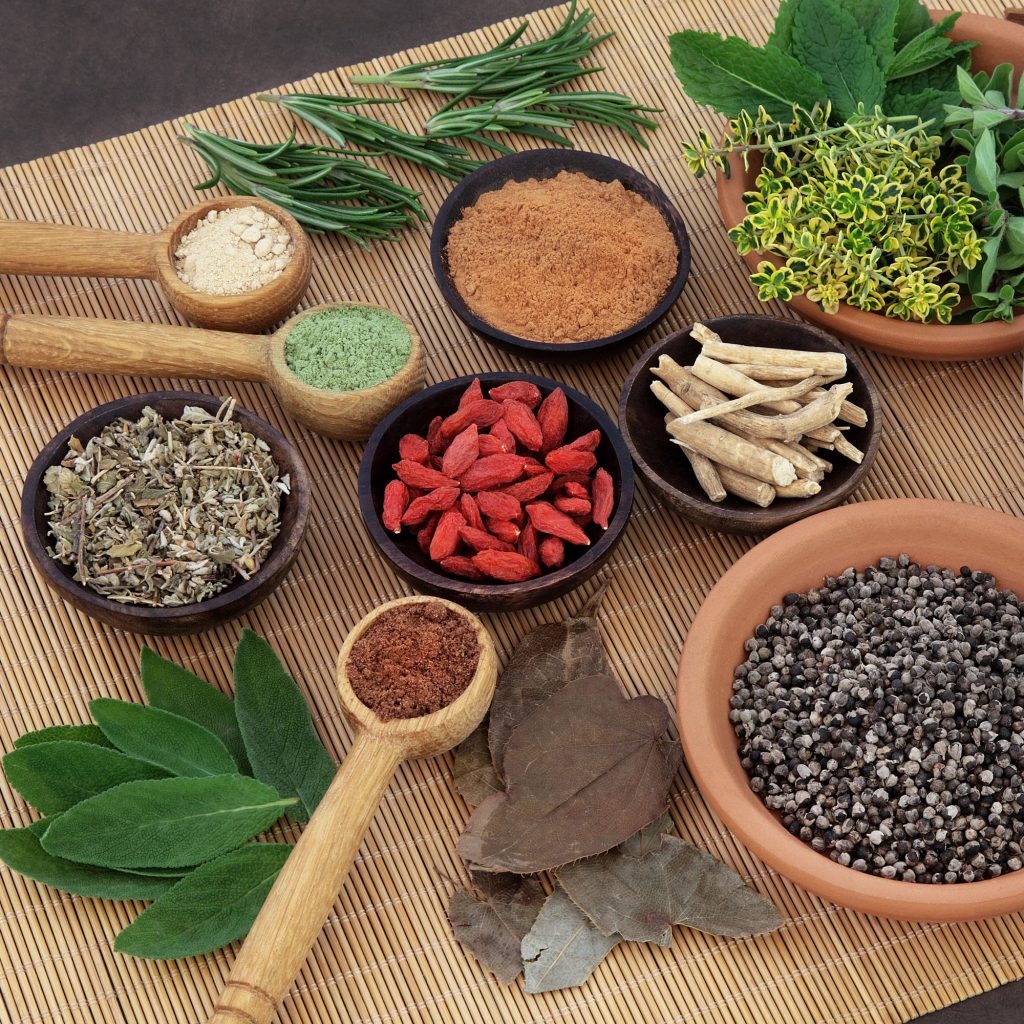No products in the cart.
Harnessing Herbal Power: A Deep Dive into Ayurvedic Wellness
Ayurveda, an ancient Indian medical system, epitomizes the philosophy of ‘Balancing Wellness Naturally’. Originating over 5,000 years ago, it is one of the world’s oldest holistic healing systems. Rooted in the belief that health and wellness depend on a delicate balance between mind, body, and spirit, Ayurveda extends beyond mere treatment of diseases. It emphasizes prevention and encourages the maintenance of health through close attention to balance in one’s life, right diet, lifestyle, and the use of herbs. This timeless wisdom, deeply interconnected with nature, offers a rich, comprehensive outlook on a life well-lived and healthy.
Principles of Ayurvedic Healing
The basic principles of Ayurveda, centered on the ‘Holistic Approach to Wellness’, revolve significantly around the concept of Doshas: Vata, Pitta, and Kapha. These Doshas represent unique blends of physical, emotional, and mental characteristics. Vata, symbolizing space and air, governs movement; Pitta, representing fire and water, oversees metabolism; and Kapha, a blend of earth and water, maintains structure. Each individual possesses a unique combination of these Doshas, influencing their health and predispositions to certain illnesses. Ayurveda seeks to balance these Doshas through personalized diet, lifestyle adjustments, and herbal remedies, thereby promoting overall well-being and preventing health issues before they arise.



Role of Herbal Remedies in Ayurveda
- Ashwagandha: Known for its stress-relieving properties, ashwagandha is a staple in Ayurvedic medicine, aligning with the ‘Holistic Approach to Wellness’. It’s believed to boost energy, improve concentration, and promote a balanced response to stress.
- Turmeric: This vibrant herb is praised for its anti-inflammatory and antioxidant effects. It’s often used to enhance skin health, purify blood, and support joint and muscle health, reflecting a holistic approach to bodily well-being.
- Brahmi: Renowned for its cognitive benefits, Brahmi aids memory enhancement, anxiety reduction, and mental clarity, embodying the holistic approach to mental wellness in Ayurveda.
- Triphala: A combination of three fruits, Triphala is a gentle cleanser for the digestive system, promoting internal cleansing and balancing all three Doshas, essential in Ayurveda’s holistic approach.
- Neem: Famous for its antibacterial and antifungal properties, Neem is used for purifying the blood, improving skin health, and promoting dental hygiene, signifying a comprehensive approach to health and wellness.
Ayurvedic Diet and Nutrition
In Ayurveda, diet plays a crucial role in ‘Balancing Wellness Naturally’. Each food item carries specific qualities that can harmonize or disturb the Doshas (Vata, Pitta, Kapha), which are vital energy forces in the body. Foods are chosen based on their ability to nurture and balance these energies. For instance, warm, grounding foods like root vegetables balance Vata, while cooling foods like cucumbers soothe Pitta. Conversely, consuming foods incompatible with one’s Dosha can lead to imbalances, manifesting as physical or emotional ailments. Thus, Ayurveda advocates a personalized diet, tailored to an individual’s Dosha profile, to promote holistic health and prevent diseases.
Lifestyle and Ayurvedic Practices
The Ayurvedic lifestyle, centered around ‘Balancing Wellness Naturally’, extends beyond diet to include practices like yoga, meditation, and Dinacharya (daily routines). Yoga, integral to Ayurveda, harmonizes the body, mind, and spirit, aiding in the balancing of Doshas. Meditation fosters mental clarity and inner peace, crucial for holistic well-being. Dinacharya, encompassing daily routines like waking up early, tongue scraping, oil pulling, and self-massage (Abhyanga), supports the body’s natural rhythms and detoxification processes. These practices collectively enhance the body’s natural healing abilities, ensuring a balanced state of health and well-being in accordance with Ayurvedic principles.



Modern Adaptation of Ayurveda
Ayurveda’s ‘Holistic Approach to Wellness’ has seen a remarkable adaptation in the modern world, as seen on platforms like ROAR Naturally. Globally, there’s a growing trend towards integrating Ayurvedic principles with Western medicine, offering a more comprehensive approach to health. This synergy is evident in the increasing use of Ayurvedic herbs and treatments alongside conventional therapies, particularly for chronic conditions where holistic care is beneficial. Furthermore, Ayurveda’s emphasis on preventative care, lifestyle modification, and natural remedies resonates with the contemporary focus on wellness and sustainability, contributing to its rising popularity and acceptance in various cultures worldwide.
Case Studies and Success Stories
Here are real-life examples of famous personalities globally who have benefited from Ayurvedic treatments:
- Christy Turlington: American model Christy Turlington embraces Ayurvedic medicines and body massages. She believes in the principles of Ayurveda for balancing individual health and has integrated it into her lifestyle, including her diet and response to the world
- Shilpa Shetty: Bollywood actress Shilpa Shetty is an advocate of Ayurveda, customizing her diet according to Ayurvedic principles. She credits Ayurveda for her fitness and clarity in choosing the right foods, including practices like drinking lukewarm water and Noni juice, and oil pulling with coconut oil
- Ricky Williams: American footballer Ricky Williams turned to Ayurveda to overcome stress, depression, and addiction. He studied Ayurveda at California College and credits the Ayurvedic lifestyle, combined with yoga, for his healing and recovery
- Kareena Kapoor Khan: Bollywood actress Kareena Kapoor Khan adopted the Ayurvedic way of life and yoga, changing her diet to include detoxifying foods like spinach soup and bottle gourd soup, and focusing on the nutritional values of her food
- Akshay Kumar: Bollywood actor Akshay Kumar has followed Ayurveda for over two decades. He advocates for the natural and scientific basis of Ayurvedic techniques and emphasizes the significance of Ayurveda as a ‘God-given’ treasure for good health
These examples showcase how Ayurveda, with its holistic approach to health and wellness, has positively influenced the lives of various celebrities across the globe.
Safety and Considerations
When embracing a ‘Holistic Approach to Wellness’ through herbal remedies, it’s crucial to address safety and efficacy concerns. While many herbs have been used traditionally for centuries and are considered safe, they can interact with medications or have side effects. It’s essential to source herbs from reputable suppliers to ensure purity and potency. Efficacy can vary based on the individual’s condition and constitution. Therefore, it’s advisable to start with small doses and monitor the body’s response. Importantly, one should consult healthcare professionals, especially when dealing with chronic conditions, pregnancy, nursing, or taking prescription drugs. This ensures a balanced and safe integration of herbal remedies into one’s health regimen.
Conclusion and Encouragement for Holistic Wellness
As you journey towards a more harmonious and balanced lifestyle, I encourage you to explore Ayurveda’s rich tradition as an integral part of your ‘Holistic Approach to Wellness’. Ayurveda doesn’t just address the symptoms but looks at the entire being, understanding that true health is a balance of mind, body, and spirit. Embrace this ancient wisdom to enhance your well-being, deepen your self-understanding, and live in harmony with nature.
Take the first step towards a more balanced and vibrant life today. Visit ROAR Naturally to discover how Ayurveda can guide you in nurturing your health holistically. Start your journey to wellness now!











